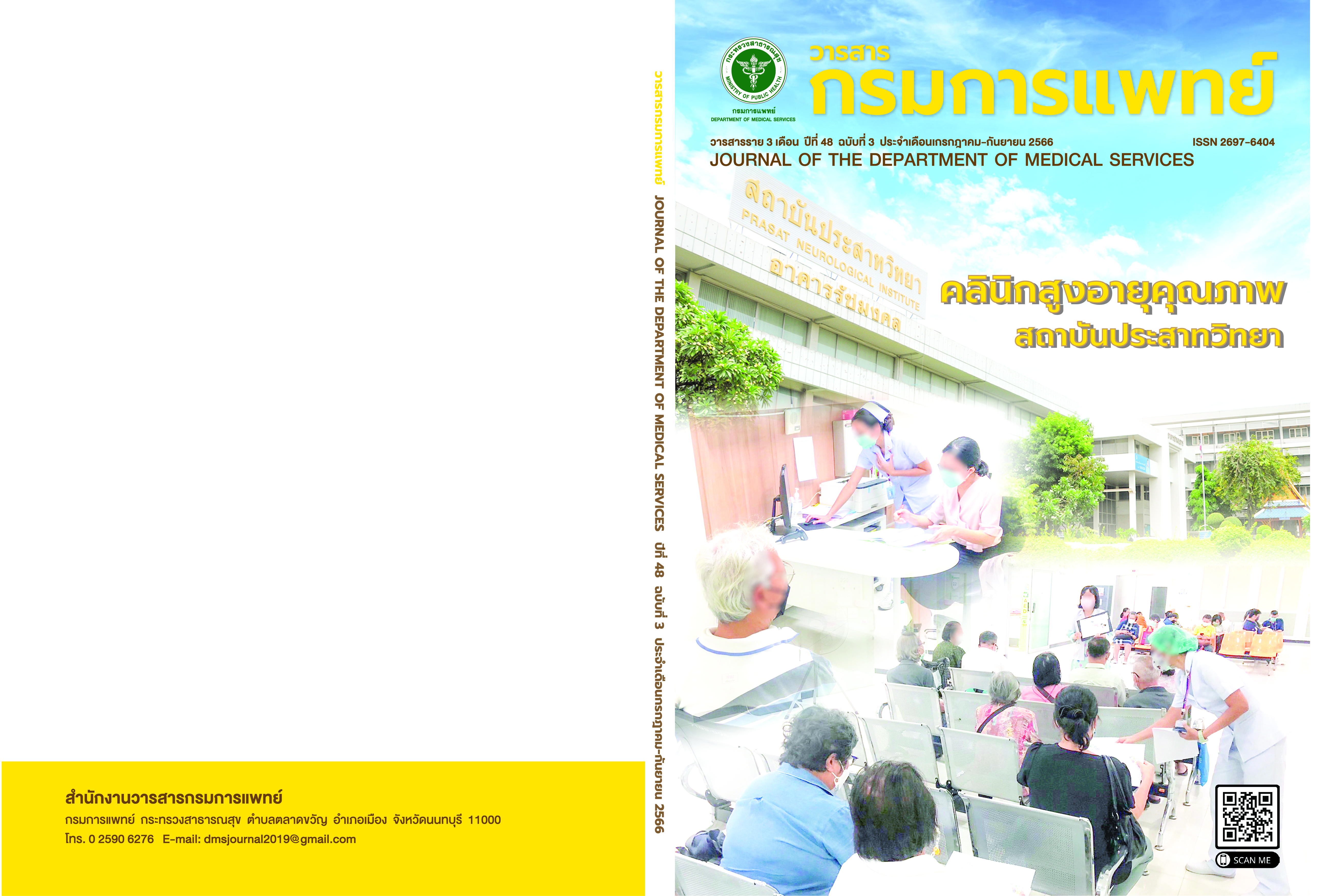Comparing the Body Weight Change in Type 2 Diabetes Patients between Received Medicines at the Hospital and by Mail Delivery During the COVID-19 Outbreak
Keywords:
Diabetes, COVID-19, ObesityAbstract
Background: The COVID-19 outbreak causes patients to avoid coming to the hospital. In addition, Rajavithi Hospital began to have a drug delivery system by mail during the outbreak. Objective: To compare differences in changes in body weight control, glucose levels, blood pressure, and lipid levels among type 2 diabetic patients who receive medication at the hospital and receive medication by mail. Method: This study was a retrospective cohort study. A total of 304 participants in the study were patients treated in diabetes clinics, 202 patients received medication at the hospital group, and 102 patients mail-in medicine group. Result: For patients receiving medication at the hospital of 202, the pre-epidemic mean weight was 68.95±14.03 kg, with a non-significant decrease at six months to 68.52±13.78 kg (p-value = .097). For patients receiving medication by mail, the previous weight was 71.74±15.42 kg and there was a non-significant reduction at six months to 69.80±14.53 kg (p-value = .059). The mean weight loss between the two groups showed no significant difference (p-value = .152). Changes in blood pressure, FPG, HbA1c, Cr, and LDL-C levels were not different in both groups. There was a greater decrease in BUN change in the postal drug group. Conclusion: The result showed no difference in body weight between the hospital and mail-order groups.
References
Aekplakorn W, Stolk RP, Neal B, Suriyawongpaisal P, Chongsuvivatwong V, Cheepudomwit S, et al. The prevalence and management of diabetes in Thai adults: the international collaborative study of cardiovascular disease in Asia. Diabetes Care 2003;26(10):2758-63.
Department of Disease Control. The situation of Covid 19. [Internet] 2020 [cited 2020 Jun]. Available from: http://ddc. moph.go.th/viralpneumonia/index.php.
Rajavithi Hospital. Statistics and Medical Records Department. Medical records of diabetes patients in the internal medicine clinic, Bangkok: Rajavithi Hospital; 2020.
Schmittdiel JA, Karter AJ, Dyer WT, Chan J, Duru OK. Safety and effectiveness of mail order pharmacy use in diabetes. Am J Manag Care 2013;19(11):882-7.
Duru OK, Schmittdiel JA, Dyer WT, Parker MM, Uratsu CS, Chan J, et al. Mail-order pharmacy use and adherence to diabetesrelated medications. Am J Manag Care 2010;16(1):33-40.
Zhang L, Zakharyan A, Stockl KM, Harada AS, Curtis BS, Solow BK. Mail-order pharmacy use and medication adherence among Medicare Part D beneficiaries with diabetes. J Med Econ 2011;14(5):562-7.
Schwab P, Racsa P, Rascati K, Mourer M, Meah Y, Worley K. A Retrospective database study comparing diabetes-related medication adherence and health outcomes for mail-order versus community pharmacy. J Manag Care Spec Pharm 2019;25(3):332-40.
Schmittdiel JA, Marshall CJ, Wiley D, Chau CV, Trinacty CM, Wharam JF, et al. Opportunities to encourage mail order pharmacy delivery service use for diabetes prescriptions: a qualitative study. BMC Health Serv Res 2019;19(422):1-8.
Badedi M, Solan Y, Darraj H, Sabai A, Mahfouz M, Alamodi S, et al. Factors associated with long-term control of type 2 diabetes mellitus. J Diabetes Res 2016;2016:2109542.
Huber CA, Reich O. Medication adherence in patients with diabetes mellitus: does physician drug dispensing enhance quality of care? Evidence from a large health claims database in Switzerland. Patient Prefer Adherence 2016;10:1803-9.
Schmittdiel JA, Karter AJ, Dyer W, Parker M, Uratsu C, Chan J, et al. The comparative effectiveness of mail order pharmacy use vs. local pharmacy use on LDL-C control in new statin users. J Gen Intern Med 2011;26(12):1396-402.
Zhang L, Zakharyan A, Stockl KM, Harada AS, Curtis BS, Solow BK. Mail-order pharmacy use and medication adherence among Medicare Part D beneficiaries with diabetes. J Med Econ 2011;14(5):562-7.
Downloads
Published
How to Cite
Issue
Section
License
Copyright (c) 2023 Department of Medical Services, Ministry of Public Health

This work is licensed under a Creative Commons Attribution-NonCommercial-NoDerivatives 4.0 International License.
บทความที่ได้รับการตีพิมพ์เป็นลิขสิทธิ์ของกรมการแพทย์ กระทรวงสาธารณสุข
ข้อความและข้อคิดเห็นต่างๆ เป็นของผู้เขียนบทความ ไม่ใช่ความเห็นของกองบรรณาธิการหรือของวารสารกรมการแพทย์



